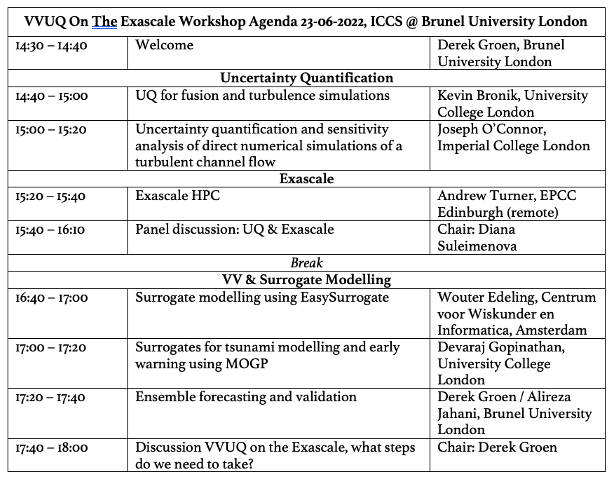
The availability of supercomputers permits studies on topics of major societal importance, including climate change, medicine and energy production, conducted at ever increasing scales and scope. However, fundamental principles of scientific investigation must be widely enforced to ensure the reliability of and confidence in the results generated. This hinges on our ability to (i) validate (V) them, normally against experimental observations, but sometimes compared to “gold standard” numerical results; (ii) verify (V) them, to ensure that the correct mathematics is used, and (iii) equip the output data with meaningful bounds on errors which come from rigorous uncertainty quantification (UQ).
Within this workshop, which will be a fully hybrid event, we will initiate a discussion about VVUQ specifically in the context of the emerging exascale computing infrastructures. We invite speakers from diverse backgrounds to present their perspectives on how we can enforce simulations with rigorous VVUQ at these scales, what techniques show particular promise in making VVUQ scalable and tractable, and what challenges we face to make exascale simulations as robust as they are detailed.
We also invite everyone, speakers and participants alike, to take part in discussions around these central themes, and to contribute towards specific strategies to improve the quality and uptake of VVUQ in a HPC simulation context. These strategies will then form a backbone for the activities in the SEAVEA project (and beyond) over the coming year.
Date and Time: 23 June 2022
Length: 3 hours
Format: Hybrid
Registration: https://intellegibilis.com/?espresso_events=iccs-2022-co-located-workshops The workshop will be ticketed via a greatly reduced ICCS conference registration. The reduced tickets can be upgraded to full tickets at a later stage if you wish to attend the main conference.
For more information, contact Nicholas Laver (nicholas.laver.13@ucl.ac.uk) or Diana Suleimenova (diana.suleimenova@brunel.ac.uk).
Agenda:


